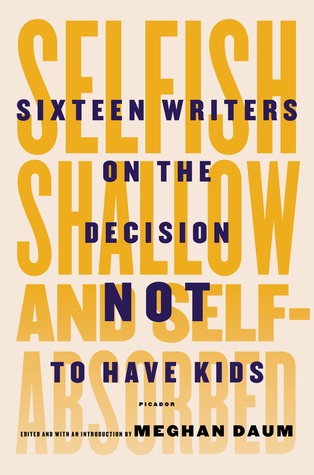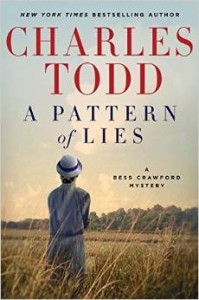 Format read:
Format read: ebook provided by the publisher via Edelweiss
Formats available: hardcover, ebook
Genre: nonfiction, essays
Length: 288 pages
Publisher: Picador
Date Released: March 31, 2015
Purchasing Info: Author’s Website,
Publisher’s Website,
Goodreads,
Amazon,
Barnes & Noble,
Kobo,
Book Depository
One of the main topics of cultural conversation during the last decade was the supposed “fertility crisis,” and whether modern women could figure out a way to way to have it all–a successful, demanding career and the required 2.3 children–before their biological clock stopped ticking. Now, however, conversation has turned to whether it’s necessary to have it all or, perhaps more controversial, whether children are really a requirement for a fulfilling life. The idea that some women and men prefer not to have children is often met with sharp criticism and incredulity by the public and mainstream media.
In this provocative and controversial collection of essays, curated by writer Meghan Daum, sixteen acclaimed writers explain why they have chosen to eschew parenthood. Contributors Lionel Shriver, Sigrid Nunez, Kate Christiensen, Elliott Holt, Geoff Dyer, and Tim Kreider, among others, offer a unique perspective on the overwhelming cultural pressure of parenthood.
Selfish, Shallow, and Self-Absorbed makes a thoughtful and passionate case for why parenthood is not the only path in life, taking our parent-centric, kid-fixated, baby-bump-patrolling culture to task in the process. What emerges is a more nuanced, diverse view of what it means to live a full, satisfying life.
My Review:
I’ve always said that two of the greatest tragedies in the world are people who desperately want to have children, but can’t, and people who know they shouldn’t have children, for whatever reason, but do. This collection of essays speaks to the latter, except, these people decided to forgo the tragedy, and just plain chose not to have kids.
As I read this collection, I heard echoes of my own thoughts in each of these essays. I could have written nearly any of them, although probably not nearly as well, because I too am childless by choice.
Because this is a collection of essays by writers, the specific reasons may or may not generalize to a greater population. But there are plenty of statistics to show that more and more people are choosing, for whatever reason of their own and in spite of societal pressure, not to have children.
For those who say that we don’t really know what we want, or that we’ll change our minds at some point, the answers in this collection are generally unequivocal. Mostly, we do know what we want, and we don’t change our minds.
There’s a sense among the group that everyone is aware that if you decide to have children and it turns out you were right about not wanting them after the fact, there are no “takesy-backsies”. It’s a decision for life.
While the majority of women still do have children, the option to remain childfree is not as rare as social pressures would make one believe. Neither the U.S. nor Western Europe produce enough children to replace their populations. At the moment, that difference is made up by immigration. What will the future bring? We will see.
Or someone else’s children will.
The reasons given by the writers in this collection vary. Some had difficult childhoods themselves, and are unsure whether they have what it takes to become good parents, not having been raised with anything like good examples.
But many have chosen this path because not just bearing children but also raising them is a burden that falls disproportionately on women. For the female writers in this collection, they recognized that they could realistically either work on their craft of writing, or they could be mothers, but not both. There’s a sense that the writers recognize that “having it all” really isn’t possible.
So they chose to produce books instead of babies. Collectively, they have decided that the choice they made was the right one for them.
It was gratifying from my perspective that some of the authors simply said that they always knew that they did not want children, and that if they had a so-called “biological clock” its alarm just never went off.
One of the most interesting commentaries was about regrets. So many people will say that we will regret our decisions later. The answer, stated quite clearly, was that of course we will. But not in the way that the speakers usually mean it to be. As adults it is impossible not to regret decisions we made, no matter which way we went. Unless you live a completely controlled life and never make any decisions at all, you are bound to regret every decision in one way or another. And if you never make any decisions, in the end, you regret that.
There’s a reason why Frost’s poem, “The Road Not Taken” is so poignant. Whatever is on the other road, we don’t get to experience it. Which does not mean that the road we chose wasn’t the right one for us.
Reality Rating A-: I found this collection fascinating because it reflected so many of my own views. This group of writers made the same choices that I did, often for reasons that were not dissimilar to my own.
There’s a sense of validation that we don’t often find in other settings. I still have people tell me that I’ll change my mind, or that I’ll regret it later. (I can’t at this point, and I’m pretty sure that I won’t) Why is this particular decision, particularly when made by a woman, something that other people feel duty-bound to weigh in on? As is observed in several of the essays, men do not face the same level of scrutiny or censure.
As much as I personally enjoyed the essays, I’m not sure that the book comes to any conclusion. I don’t think it makes a case per se. What is does show is that there are as many reasons that people chose not to have children as there are people who have made that choice.
The argument, not necessarily stated outright, is that each person must make this decision for themselves, and that the life they create out of that choice is the one that they believe will be satisfying for themselves.
And that everyone else needs to step away from forcing that decision. This is one of those cases where no one can really walk in anyone else’s shoes, and society should quit presuming to try.
***FTC Disclaimer: Most books reviewed on this site have been provided free of charge by the publisher, author or publicist. Some books we have purchased with our own money or borrowed from a public library and will be noted as such. Any links to places to purchase books are provided as a convenience, and do not serve as an endorsement by this blog. All reviews are the true and honest opinion of the blogger reviewing the book. The method of acquiring the book does not have a bearing on the content of the review.
 This is weird. I’m writing this before we leave for Sasquan, but by the time you read it, we’ll be on our way back. From here, I’m hoping that our suitcases won’t be overloaded with books, but that may be a vain hope. I try to resist picking up print books in the dealer’s room, because most of what I see I either have an eARC, or I’m willing to wait to get as an ebook. Howsomever, the one thing that is still better with print is signed books. For that, you need a physical copy. I know John Scalzi will be at Sasquan, which means a print copy of The End of All Things is definitely in my bookish future. As for the rest, we’ll see.
This is weird. I’m writing this before we leave for Sasquan, but by the time you read it, we’ll be on our way back. From here, I’m hoping that our suitcases won’t be overloaded with books, but that may be a vain hope. I try to resist picking up print books in the dealer’s room, because most of what I see I either have an eARC, or I’m willing to wait to get as an ebook. Howsomever, the one thing that is still better with print is signed books. For that, you need a physical copy. I know John Scalzi will be at Sasquan, which means a print copy of The End of All Things is definitely in my bookish future. As for the rest, we’ll see. Current Giveaways:
Current Giveaways: Blog Recap:
Blog Recap: Coming Next Week:
Coming Next Week:

